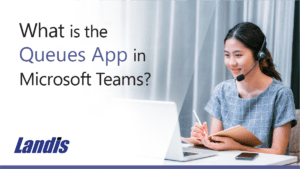Attendant Pro for Skype for Business and Microsoft Lync 2013 Getting Started
Contents
Registering Your Attendant Pro 6
RGS (Response Groups) Server Agent Groups Panel 16
Caller Information (Incoming Call Pop) Panel 17
Contact (large/touch form factor) 24
Other Contact Methods Menu & Contact Right Click Menu 24
Running Through Some Scenario Using the Attendant Pro 26
Answer and Blind Transfer Using Keyboard 26
Answer and Consult Transfer Using the Keyboard 26
Answer, Hold and Retrieve from Hold Call Using Keyboard 27
Shortcut Setup (Quick Access Shortcuts Menu) 31
Centralized Setting Management 32
Exchange Server Shared Calendar Configuration 34
When I answer a call on my Lync Phone Edition device the call disappears from Attendant Pro. 37
What I answer a call it just disappears from Attendant Pro. 38
Incoming calls show both on the Lync 2013 Call Notification & Attendant Pro. 38
Appendix I – Contact Card Fields 39
Appendix II – CRM/ERP Call Popup Tips 41
Prerequisites
Lync 2013 client must be installed, running and logged in. To use all features it must be Lync 2013 full edition (not basic)
Installation
Installing Attendant Pro is probably the easiest thing you will do during a Lync deployment as it is literally just a 1 minute task!
NOTE: Before you start, make sure that Skype for Business (Lync 2013) is installed, running and logged in. The Attendant Pro requires that Skype for Business (Lync 2013) is running.
Now browse to: https://landistechnologies.com/pages/AttendantProDownload.aspx
Click on “Install” (below)

Click “Run”

If you see the below “Application Install” window, click “Install” (otherwise this will be automatic)

Installation will just take a moment and will indicate Progress.

Once the install is complete, there will be a shortcut on your desktop and Attendant Pro will run.
Registering Your Attendant Pro
Click on the “Settings” as shown below and then click “Get Key” button. Attendant Pro will prompt you for some contact information and when this is submitted a 30 day, fully functional key will be retrieved. (This key will be used for any subsequent users on this SIP domain)
NOTE: Retrieving the key may take a few seconds.
NOTE: Your PC will need access to http://lcregistration.cloudapp.net/ so make sure your firewall is not blocking this domain.

If this is the first time your organization is getting keys, you will be asked for contact information. Enter the information and you will be automatically given a key.

NOTE: If you do not register you will be able to run Attendant Pro, but calls will be ended at 15-30 seconds. This will end calls made with Skype for Business (Lync) as well!
Upgrading Attendant Pro
Upgrading Attendant Pro is as easy as exiting the program and running it again. Every time you start Attendant Pro it checks for new updates via “Click Once” technology and you can decide if you want the new version. You can upgrade to the latest version with one click and your previous settings will be retained.

Attendant Pro Quick Tour
Below we’ll give a quick overview of the Attendant Pro main window layout and functionality.
Overall Screen Layout
We’ll give a quick tour of the overall layout of Attendant Pro.

The main Attendant Pro window is made up of several panels. These include:
- My Information
- Incoming Calls
- Current Call
- Handled Calls
- Quick Access Shortcuts
- Contact Groups
- Contact Details (can be turned on/off)
- RGS Agent Groups (can be turned on/off)
- Caller Information (can be turned on/off)
-
Contact Search
- Dial pad (can be turned on/off)
- Dial pad (can be turned on/off)
- Information Panel
NOTE: Some panels can be turned on or off. This can be done via the Options window or from the main screen Contact Groups panel header. (see below)

My Information Panel

The “My Information Area” shows information and gives control over the current user logged into Skype for Business (Lync). This includes
- Displaying the user photo and presence
- Displays the user name and allows changing who the user is impersonating/calling as
- Ability to change presence
- Ability to change the current user note
My Phone & Presence
Shows the current users’ presence and note and lets these settings be changed.
Username (Call As)
The user name is a drop down that allows you to change who you are calling out as. (This could be another user you are a delegate for, an anonymous response group or yourself) By default your “Call As” identity will be set back to yourself after one call, but this can be changed in Options.

My Presence
You can set your presence.

My Note
You can set the note others see.
Incoming Calls Panel
The Incoming Calls Panel is where incoming calls will appear.

Attendant Pro can accommodate unlimited incoming calls. There is space for up to 8 incoming call will be shown, after that there will be a scroll bar to show more. A shortcut key can be defined to answer incoming calls on a FIFO (first in, first out) basis.
NOTE: Calls can be answered using the Skype for Business (Lync) call toast as well.
Current Call Panel
The current call panel display controls for the current active call. The call that you are speaking to will be shown in the Current Call panel.

From here you can put a call on hold or park, transfer, mute or hang-up. All call handling options are displayed on the screen for one click access
- Mute/Unmute
- Hang Up
- Hold
-
Park
- Right click for Park for User or Park for Group
- Right click for Park for User or Park for Group
- Blind Transfer
- Safe Transfer
- Consultative Transfer
- Add/Invite a Contact to the call
- More
- Instant Message
Below is a zoomed in screenshot of the current call window.
Handled Calls Panel
“Handled Calls” is where you will see call that have been placed on hold or park.

A timer will indicate time on hold and/or park orbit number. Click on retrieve will bring the call to “Current Call” panel. A left click on the “More” button will display a menu that gives more options you can do to this call.

Quick Access Shortcut Menu
The Quick Access Shortcut Menu allows you to make mouse/keyboard shortcuts to regularly done common communication tasks.

We will show how to create these shortcuts in the Options section.
Contact Groups Panel

The “Contact Groups” area shows all the Lync Contact Groups you have configured in the Skype for Business (Lync) client. If you click on one the contacts Groups the contacts in the group will be shown below. You can use “Contact Groups” to call or transfer calls. To see a detailed description of how Contacts work, see “Contacts” below.
Contact Details Panel
When you click on a contact, Contact Details can show more information about the contact. As seen below [1] Contact and presence, [2] editable user note, [3] all the contact methods and features and [4] other contact detail information.
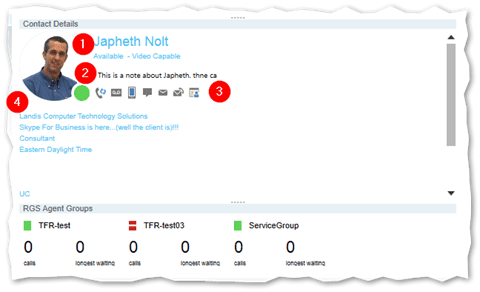
RGS (Response Groups) Server Agent Groups Panel
This panel (shown above) display the Skype for Business (Lync) agent groups that the currently signed in user is a part of, signed in status and how many calls and wait times.
Options and Voicemail Area
On the right side of the Attendant Pro main screen you will see the Voicemail, Options and Option menu buttons.

My Voicemail shows how many voicemails are waiting. The Options button opens the Options/Settings window to configure Attendant Pro. (Discussed in detail here) The Options Menu button display a menu to give you access to advanced features.

xx
Caller Information (Incoming Call Pop) Panel

The incoming call pop area will show an URL you can define. You can pass the incoming phone number as well. Caller Information is setup in Options (click here)
Contact Search Panel
The contact search panel lets you easily search for an existing contact or dialing a new number.

“Contact Search” has a global hotkey (meaning you can press this key even if Attendant Pro does not have the focus). The “Contact Search” field default global hotkey is assigned to Windows + A, but this can be changed. Now you can type in a phone number, extension number or contact name. If you press [ENTER] the focus will jump to the first returned contact. You can now use the arrow keys to select the correct contact or press [ENTER] if you are on the correct contact already. Of course you can also use the mouse and single click a contact to select or double click as well.
On each contact you will see the presence, contact name and buttons for Call Lync or Call Voicemail. If you would like to use another contact method you can open the other contact methods menu in several ways:
- Right click on the Contact button
- Press the Menu button on your Windows Keyboard
- Press [Shift]+[F10]
If you double left click a Contact or press [ENTER] when a Contact is selected it will use the “Contact Double Click Action” (setup in settings) method to call to call the contact.
- Smart
- Work
- Mobile
- Lync Call
- Voice Mail
Most of these contact methods are probably self-explanatory except “Smart”. “Smart” will look at contact and if there is only 1 contact method will use that. If there is more than one contact method it will use “Lync Call”. The default “Contact Double Click Action” is “Smart”.
NOTE: If you have the “Contact Double Click Action” set to a method that is not valid for the current contact, Attendant Pro will fall back to “Smart”.
Notification Area
When there are notifications, warnings or errors, they will display in the lower right side of Attendant Pro.

A notification can be dismissed by click X or Dismiss.
Status Area
The status area gives at a glance, keyboard shortcuts and status of Attendant Pro.

Moving from left to right:
-
Keyboard Shortcuts
- See more details under section “Global Hotkeys”
- See more details under section “Global Hotkeys”
-
Transfer mode:
- Off
- Blind
- Blind Safe
- Consultative
- Off
-
Keypad Mode
- Dialing
- DTMF
- Dialing
Contact Layouts
Contacts are displayed and acted on in Attendant Pro using a Contact Layout. Contacts you see when you search, in Contact Groups or Contact Details are Contact Layouts.

Contact Layouts are much like Contacts you see in Skype for Business (Lync) with several key differences:
- Contact Layouts are design with 1-click access to commonly used contact methods (no hovers or drop down menus to navigate)
- More information about a Contact Layout can be shown by turning on the Contact Details panel. (more click here)
- Contact Layouts are contextual (if you are not in transfer mode, they will call the contact, if you are in transfer mode they will transfer the call to the contact)
- Because of this Contact Layouts can be used to transfer or call a contact unlike the Skype for Business (Lync) contact list. (in Skype for Business (Lync) can’t use your contact list & groups to transfer a call, it is another more simplified window)
- There are 3 predefined Contact Layouts you can switch between (from Contact Groups Header or Options window)
- There are 3 Contact Layouts that can be entirely customized (size, colors, buttons, graphics, fields) to your requirements using standard XAML (XAML expertise required)
Let’s go over the characteristics of a contact layout in more detail.
Presence
Each contact layout will show the presence of this contact. The presence states are indicated:
|
Icon |
Status |
|
|
Available |
|
|
Busy |
|
|
In a Call (at a glance indication if someone is on a call) |
|
|
Away |
|
|
Offline |
|
|
No Contact |
The “Contact” panel works the same in “Contact Groups” and “Contact Search”.
Context Menu Options
Each contact layout includes a context menu/right click menu that will include all the contact methods plus some other features even the the Contact Layout design does not.
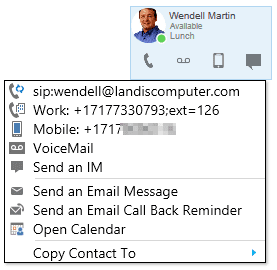
The Other Contact Methods menu can be opened by :
- Right click on Contact Name
- Press the Windows keyboard Menu Key (shown below)

This menu adds:
- Manage contact groups
- Tag a contact for presence changes
Contact Layout Double Click Action
What happens we a contact layout is double clicked can be configured in the Options. (see more click here)
Global Hotkeys
The global hotkeys work even if Attendant Pro does not have the focus. The global hotkeys will not even cause Attendant Pro to get the focus, except in the case of F9 or Windows + A as noted below.
- F6 – This will Answer an incoming call
- F7 – This will place the current call on hold
- F8 – This will retrieve the first call put on hold (using FIFO)
- F9 – Transfer a call (using Blind Transfer at this time, to be configurable in future. (See Settings Configuration on page 19) Also note that F9 is special in that it sets the focus to Attendant Pro and puts your cursor in the “Contact Search” field. This means that you can press F9, then type extension or username, press [ENTER] [ENTER] to transfer a call.)
- F10 – Disconnect or Hang-up the current call
- Windows + F4 – Toggles Mute on Current Call
- Windows + A – Attendant Pro gets focus and cursor is put on “Contact Search”.
All of the above actions can also be achieved by clicking on screen buttons as well.
Running Through Some Scenario Using the Attendant Pro
Answer and Blind Transfer Using Keyboard
NOTE: To Blind Transfer using the keyboard you need assign the Hotkey Transfer Type” to “Blind” by clicking “Options” in the upper right of the main Attendant Pro screen.
First well run through a scenario answering a call and transferring the call entirely using the keyboard.
When you see an incoming call press F6
The call will now be answered and you can transfer by press F9. The focus will move to “Contact Search” so you can now type in the extension number of the person you want to transfer to, say, “101”. After we type in 101 we press [ENTER] to move the Contact area and since the first contact is the one we want we can press [ENTER] again to complete the transfer.
All key presses to transfer this call:
- F6
- F9
- 101 (Extension number to transfer to)
- [ENTER] [ENTER] (finalize transfer)
Answer and Consult Transfer Using the Keyboard
NOTE: To Consult Transfer using the keyboard you need assign the Hotkey Transfer Type” to “Consult” by clicking “Options” in the upper right of the main Attendant Pro screen.
When you see an incoming call press F6
The call will now be answered and you can start the consult transfer by pressing F9. You are now in Consult Transfer mode. (as shown at in the indicator area at the bottom of the screen.) The focus will move to “Contact Search” so you can now type in the extension number of the person you want to consult/transfer to, say, “101”. After we type in 101 we press [ENTER] to move the Contact area and since the first contact is the one we want we can press [ENTER] again to call this contact. Now you can consult with this person. When you are ready to transfer the call to them, just press F9 to complete the transfer.
All key presses to transfer this call:
- F6
- F9
- 101 (Extension number to transfer to)
- [ENTER] [ENTER] (now you can “consult”)
- Press F9 when you are ready to transfer the original caller.
Answer, Hold and Retrieve from Hold Call Using Keyboard
When you see an incoming calls press F6. To put the call on Hold just press F7. To retrieve you press F8. Note that F8 retrieves in FIFO order.
- F6
- F7
- F8
Dial a Number
- Windows + A (or just click in Contact Search field)
- 101 (Extension number to dial)
- [ENTER] [ENTER]
Options Configuration
The Settings screen is where you can change the setup of Attendant Pro. As soon as you change the setting it will be saved and take effect.
General
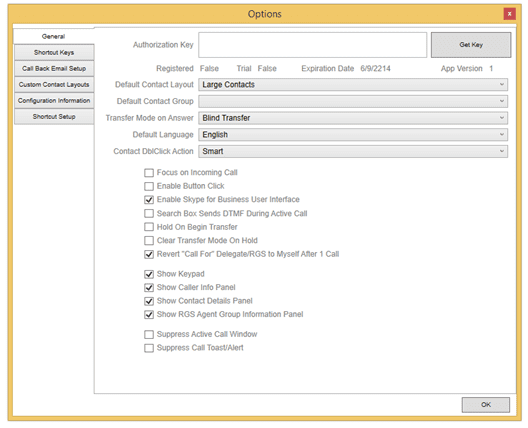
- Activation Key: Your organizations key will displayed here.
- Default Contact Layout: which contact layout will be displayed for contact groups, search and contact details area.
- Default Contact Group: The Contact Group that is selected when Attendant Pro is started.
- Transfer Mode on Answer: The transfer mode a call set to when a call is answered. It can be set to none, which means you need to click one after answering a call.
- Default Language: This will be set based on operating system language, or you can manually set it using this setting.
- Contact Double Click Action: The action is taken when a Contact Layout is double clicked. (More on Contact Layouts: click here)
- Focus on Incoming Call: Should Attendant Pro be set to foreground and restored on incoming call
- Enable Button Click: an audible sound when a button is clicked. (touch scenario)
- Enable Skype for Business User Interface: when unchecked Attendant Pro uses a Lync 2013 user interface and when checked a Skype for Business user interface.
- Search Box Sends DTMF During Active Call: when user types into search box during a call it will send DTMF and search.
- Hold On Begin Transfer: Determines if call is placed on hold while user searches for a contact to transfer to
- Clear Transfer Mode on Hold: whether transfer mode will be cleared when a call is put on hold
- Revert “Call For” Delegate/RGS to Myself After 1 Call: If a user changes “Call As” should it revert to self afer 1 call or stay as set “Call As” (More on changing Call As: click here)
- Show Keypad: Turning this off does not hide Search ability, just kepad. Turning this off might be desired in a non-touchscreen scenario to optimize search results space
- Show Caller Information Panel
- Show Contact Details Panel
- Show RGS Agent Group Information Panel
- Suppress Active Call Window: This will minimize the Skype for Business (Lync) conversation window so it does not pop up in front of Attendant Pro.
- Suppress Call Toast/Alert: This will minimize the Skype for Business (Lync) incoming call toast/alert/notification for those who don’t want to see it. Do note that a call can be answered for Attendant Pro using the Skype for Business (Lync) Call Toast or Attendant Pro Incoming Calls area.
Shortcut Keys
Here you can define what key you want assigned to Attendant Pro functions. Just type a key combination in the field and decide if you want this shortcut to only work in Attendant Pro application or anywhere in Windows (Global).

Call Back Email Setup
Setup templates for Call Back Email and Call Park For.
Custom Contact Layouts
Ability to copy XAML custom contact layouts.
Configuration Information
You can setup the call pop URL under “Settings”. Below is a public page you can call as an example:
The Lookup URL will take effect immediately and there is no need to restart Attendant Pro.
NOTE: The above White pages example is just a sample to demonstrate the capability of Attendant Pro call pop functionality and you will likely want to use an internal web server that returns information from your CRM, ERP or other line of business application (LOB). If you do not currently have a web server that can deliver this kind of information out of your LOB application, take a look at SQL Server Reporting Services (aka SSRS). More information on SSRS is available here:
http://technet.microsoft.com/en-us/library/ms159106.aspx
Shortcut Setup (Quick Access Shortcuts Menu)
Quick Access Shortcuts Menu allows you to setup macro-like shortcuts to common used communication tasks.

Centralized Setting Management
You can either manually enter Attendant Pro settings in the Settings screen or you can push the settings out via Group Policy by setting registry settings.
Below is a list of settings that can be set by registry setting via Group Policy or directly.
-
DefaultContactGroup
- The Contact Group selected on startup. (this needs to be a Contact Group defined for this Lync user)
- The Contact Group selected on startup. (this needs to be a Contact Group defined for this Lync user)
-
AuthorizationKey
- Your registration authorization key.
- Your registration authorization key.
-
BaseLookupURL
- The URL that will be invoked on incoming call popup. Substitute {phoneno} will be the incoming phone number as transformed by [PhoneNumberPattern] and [PhoneNumberTranslation].
- The URL that will be invoked on incoming call popup. Substitute {phoneno} will be the incoming phone number as transformed by [PhoneNumberPattern] and [PhoneNumberTranslation].
-
PhoneNumberPattern
- Phone Number Regex Pattern to Match
-
An example of matching USA E164 like +18005551212 would be:
- ^\+1(\d{10})
- ^\+1(\d{10})
- Phone Number Regex Pattern to Match
-
PhoneNumberTranslation
- Phone Number Regex Translation Pattern.
-
An example of translation for USA E164 like +18005551212 would be:
- $1
- $1
- Phone Number Regex Translation Pattern.
-
HotkeyTransferType
- When you press the global hotkey for transfer, what type of transfer is initiated
-
The options are
- Blind
- Safe
- Consult
- Blind
- When you press the global hotkey for transfer, what type of transfer is initiated
-
DefaultContactLayout
- The default contact layout and size.
-
The options are
- Small
- Medium
- Large
- Small
- The default contact layout and size.
-
HotkeyAnswer
- The Global hotkey for answering a call.
-
Valid values are
- Alt
- Control
- None
- Shift
- Windows
- Alt
- The Global hotkey for answering a call.
- HotkeyModifierAnswer
You can directly add the registry key to test:
HKEY_CURRENT_USER\Software\Policies\LandisComputer\AttendantPro

In the LandisComputer\AttendantPro folder, right click and add New | String Value with the name of one of the settings above and an appropriate value.
The setting will take effect immediately. In the Attendant Pro Setting screen the setting will now be locked and not editable since you have set this setting from the registry.
Exchange Server Shared Calendar Configuration
Attendant Pro provides the ability for console operators to easily open Exchange shared calendars directly from contact layouts in Attendant Pro. This requires no additional Attendant Pro servers or specialty Attendant Pro knowledge to configure and depends entirely on existing Microsoft Exchange infrastructure.
Requirements
- Exchange Server and shared calendars implemented
- Calendars shared with attendant console user at least Permission Level of “Reviewer”
- The attendant console user’s Outlook has cached mode disabled.
Attendant Pro “Open Calendar” functionality depends on Exchange being installed. The next step is making sure the calendars are shared with the minimum Permission Level of “Reviewer”. This can be done centrally using Exchange Powershell by the administrator.
Alternatively it can be done by the user who wants to share their calendar with the console operator. (We will demonstrate how to configure share permission using Outlook 2013, but some older versions of Outlook will work as well.) On the PC of the user that wants to share their calendar with the console operator users open Microsoft Outlook 2013 and go to Calendar panel. Now right click on the user’s own calendar, in the right-click menu click “Share” | “Calendar Permissions”.

In the “Calendar Properties” click the “Permissions”. Now set the “Permission Level” for the console operator(s) to “Reviewer” or higher permission. Click “Apply”.

The next step is to disable “Cached Mode” in Outlook 2013 and will be performed on the attendant console user’s PC. Open Outlook 2013, click File | Account Settings | Accounts Settings as shown below:

Now under “E-mail” tab select the attendant console user | “Change” | uncheck “Use Cached Exchange Mode | Next | Ok | Finish

Now you will need to restart attendant console users’ Outlook 2013.
NOTE: We have noticed that the attendant console user needs to restart Outlook 2013 after calendar permissions are changed for other users. So if the administrator gives attendant console user permissions to view new calendars, the attendant console user needs to restart Outlook 2013. This appears to be a limitation of Outlook 2013
Now the attendant console user can right-click on any contact layout and click “Open Calendar” and the Outlook 2013 calendar will be opened. (Exchange security is strictly observed, so operator can only access calendars they have been given permissions of course)

Knowledge Base Articles
When I answer a call on my Lync Phone Edition device the call disappears from Attendant Pro.
This means that the Lync Phone edition device is not properly paired to the Lync 2013 client. Make sure that LPE device works with Lync 2013. Take a look at the lower right of the Lync 2013 client to see if there are any errors.
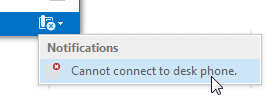
If you see this error you may need to sign out of Lync 2013 and in again. After you have the LPE device properly working with Lync 2013, restart Attendant Pro.
What I answer a call it just disappears from Attendant Pro.
Verify you have a default audio device configured. (if you answer a call without an audio device configured the call will be sent to voicemail and appear to have “dropped”)
Incoming calls show both on the Lync 2013 Call Notification & Attendant Pro.
This is how Attendant Pro is designed. You can answer anywhere you like and the call will be taken by Attendant Pro.
Appendix I – Contact Card Fields
Below is a list of the possible fields on a contact card: (at this time not editable) Names are capital sensitive in XAML.
|
Attendant Pro |
Lync |
What it does |
Notes |
|
Displayname |
Contact display name |
||
|
Companyname |
AD companyname |
||
|
ContactNote |
OutOfficeNote or PersonalNote |
“What’s happening today?” note in lync |
|
|
Availability |
Availability |
Exchange/Calendar free/busy/away/idle |
|
|
ActivityString |
Activity |
Available, In a meeting, In a call, Away, etc |
|
|
Photostream |
Contact photo |
Needs to be coverted using “{Binding PhotoStream, Converter={StaticResource LyncImageConverter}}” |
|
|
IconStream |
Type of contact: skype, AOL, etc |
Needs to be coverted using “{Binding IconStream, Converter={StaticResource LyncImageConverter}}” |
|
|
AvailabilityImageURI |
Square presence indicator |
||
|
Uri |
Uri |
Sip: + URI. Ie=sip:john@company.com |
|
|
DefaultNote |
DefaultNote |
<empty> |
|
|
contactTimeZone |
TimeZone |
||
|
MeetingSubject |
MeetingSubject |
||
|
MeetingLocation |
MeetingLocation |
||
|
DepartmentName |
Department |
||
|
contactCapabilityString |
CapabilityString |
Video Capable, No IM, etc |
|
|
contactCapabilityDetails |
CapabilityDetails |
[objects] not useful |
|
|
contactAttributionString |
AtrributionString |
External Network, Skype/AOL/etc, CompanyName, |
|
|
contactIdleStartTime |
IdleStartTime |
||
|
contactCurrentCalendarState |
CurrentCalendarState |
0,3,5 etc |
|
|
contactTimeZoneBias |
TimeZoneBias |
||
|
contactTitle |
|||
|
PrimaryEmail |
PrimaryEmailAddress |
Email address |
|
|
WorkPhone |
|||
|
HomePhone |
|||
|
MobilePhone |
<empty> |
||
|
OtherPhone |
|||
|
Voicemail |
|||
|
contactNextCalendarState |
|||
|
contactNextCalendarStateStartTime |
|||
Appendix II – CRM/ERP Call Popup Tips
Salesforce
- You will need to enter the password into Salesforce on the first “call pop”. To enter the password copy it into the field as you will not be able to type it. (using single sign on can avoid needing to type the password)
- You will likely want to change the “Search Results” screen in Salesforce to fit the “Caller Information” area better (see Salesforce documentation for this)
- To open a record, use Shift + left click to open the record in a new browser instead of inside the “Caller Information” window.
-
The “Lookup URL” will look something like below (except that the “na17” will be unique to your server)
- Salesforce search requires that the phone number be formatted with parenthesis and dashes. For example in the USA a number needs to look like: 717-733-0000. To do this use “Phone Number Pattern/Translation”
Whitepages
Appendix III – Settings
|
Setting |
What it does |
Notes |
|
DefaultContactGroup |
The Contact Group selected on startup. |
|
|
AuthorizationKey |
Your registration authorization key. |
|
|
BaseLookupURL |
The URL that will be invoked on incoming call and shown in the call pop area. Substitute {phoneno} will be the incoming phone number as transformed by [PhoneNumberPattern] and [PhoneNumberTranslation]. |
Must be http not www. |
|
PhoneNumberPattern |
Phone Number Regex Pattern to Match |
|
|
PhoneNumberTranslation |
Phone Number Regex Translation Pattern. |
|
|
Test Phone Number |
This is a number you can use to test if your [PhoneNumberPattern] and [PhoneNumberTranslation] regex is working correctly and simulate a incoming call pop to test your [BaseLookupURL]. |
Not exactly a setting, but it is saved for future use. |
|
HotkeyTransferType |
This determines what transfer type is initiated when a user presses the global hotkey for transfer. |
|
|
DefaultContactLayout |
The default contact layout and size. |
|
|
FocusOnIncomingCall |
Attendant Pro will restore or maximize on incoming call |
Yes or No |
|
ContactDoubleClickAction |
What action will occur when you double click on an contact |
Smart Work Mobile Lync Call Voice Mail |
Other
The presence states are indicated:
|
Icon |
Status |
|
|
Available |
|
|
Busy |
|
|
In a Call (at a glance indication if someone is on a call) |
|
|
Away |
|
|
Offline |
|
|
No Contact |













